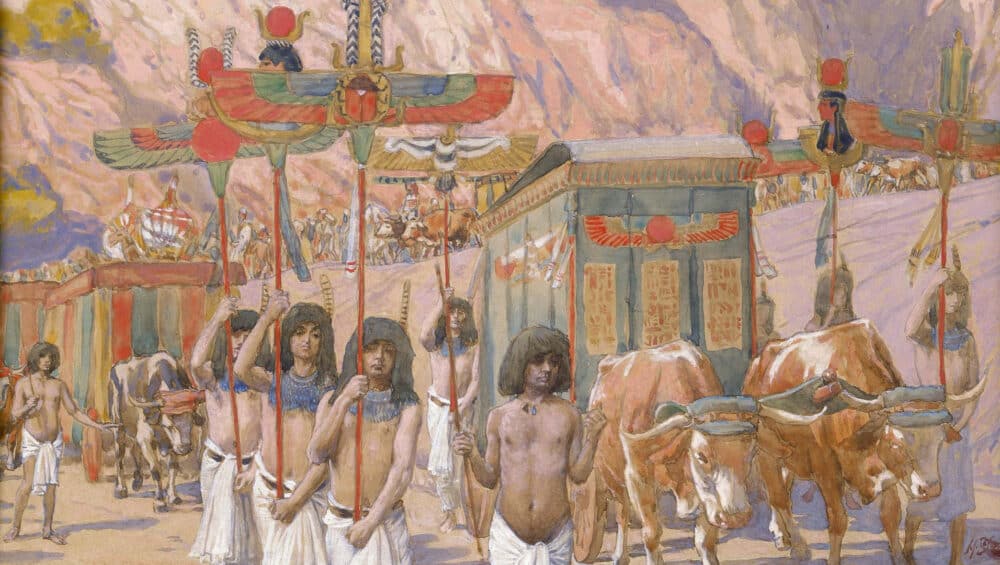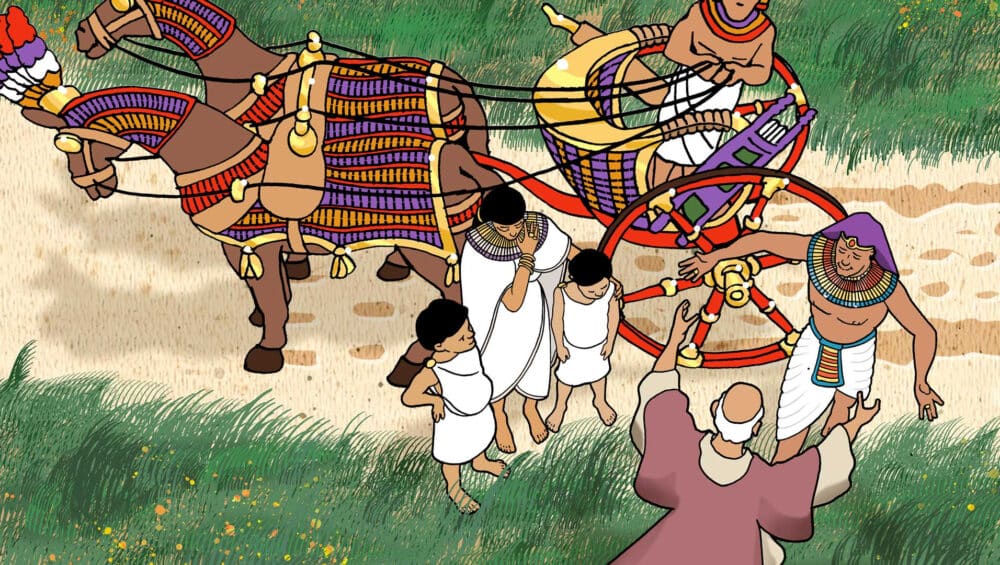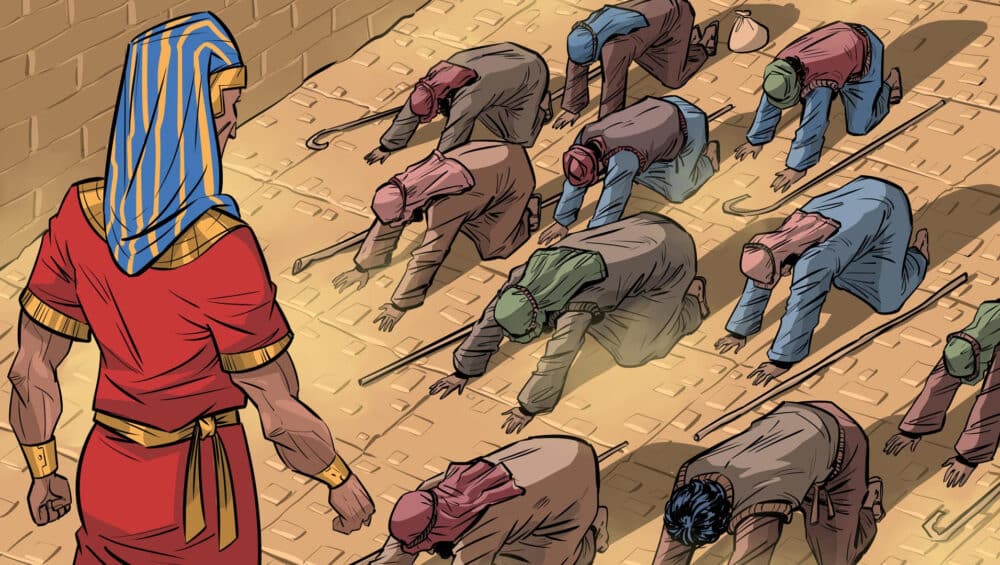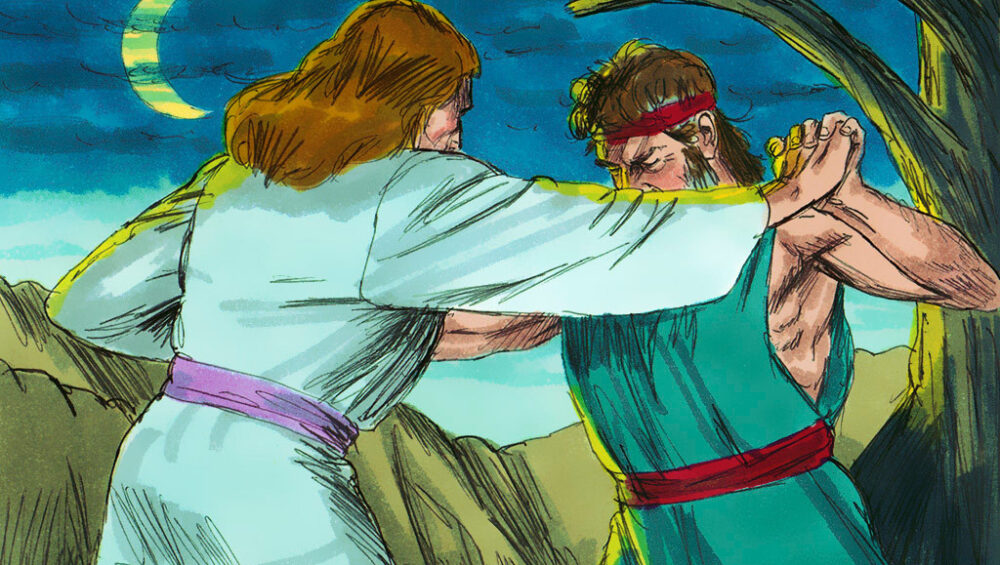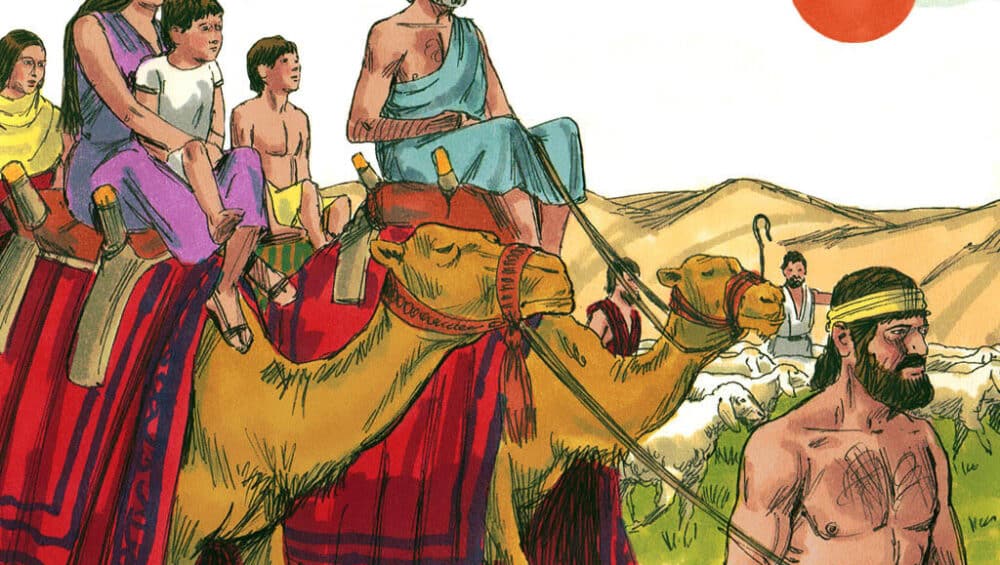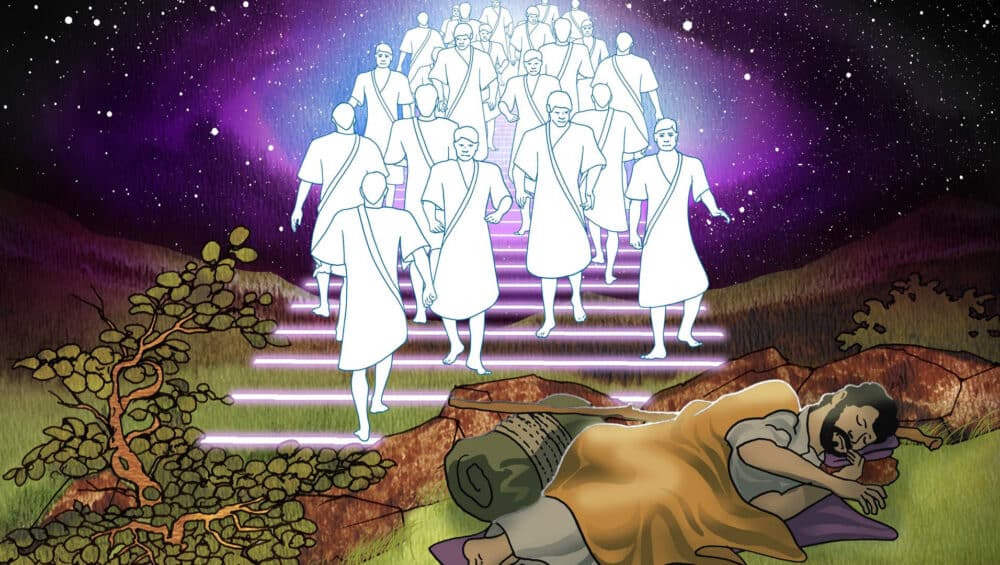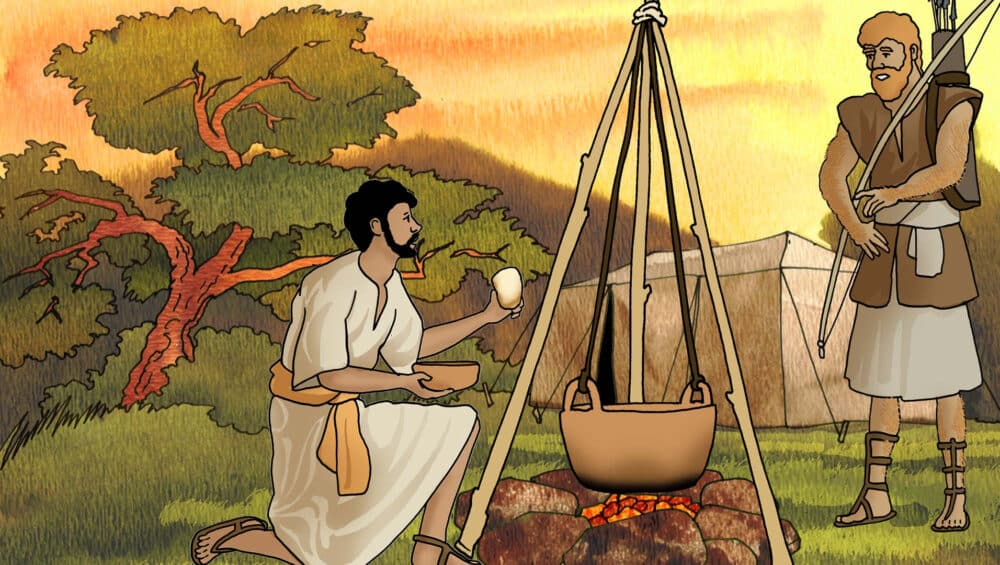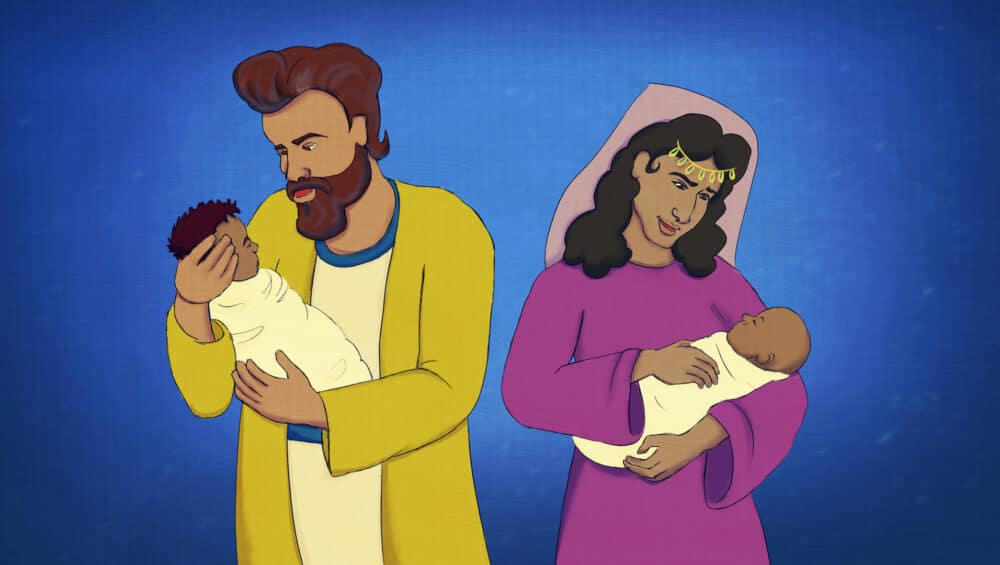The Jewish Museum / A gift of the heirs of Jacob Schiff
Welcome to Livin’ Light’s Bible-In-A-Year challenge of discovering God’s love for us and His purpose for our lives. Here is the format for this great adventure: The daily reading assignment is posted at 5 a.m. After each day’s reading, Leigh An Coplin, the blog host, shares observations and poses questions about difficult passages to Rob Fields, who studied Christian Education at Asbury Seminary and currently teaches Biology in the Orlando area. To start from the beginning, click on 365 Bible Readings and scroll down to Day 1. The reading schedule is taken from The One Year Chronological Bible NLT.
Today’s Reading
— Genesis 47:28-50:26
(1875-1859 BC) Click here for a timeline of the whole Bible.
Questions & Observations
Q. (47:28): There is about a 140-year discrepancy when this story took place? Can you explain anything about how scientists have a hard time pinning down the dates?
A. I am honestly surprised that they can even make the two estimates that they have. I feel that the dates they suggest are a bit too specific for my taste, mostly because you are talking about a period that was more than 3,500 years ago.
Here’s how it breaks down: we have some dating and archeological evidence for the united kingdom of Israel (which was ruled by Saul, David, and Solomon — recorded in 1 and 2 Samuel) that exists somewhere around 1000 BC. The OT tells us that each of these men ruled for 40 years each, so there is a 120 year period (roughly) of united leadership before the nation fractures and falls apart after Solomon’s death (recorded in 1 and 2 Kings and Chronicles). So basically, from there, scientists (this would include archeologists, but also linguists and other fields of study) have to work their way back to the previous events as presented in the OT (there are some scholars who doubt the authenticity of most of the writings that predate David’s kingdom, so that option is “on the table” too, though I think these scholars are TOO skeptical).
Working our way back, the OT (mostly Joshua) tells us that Joshua and the armies conquered Canaan after 10 years or so, and that the Israelites were in the desert 40 years, and in Egypt around 400 years. So now we are back 450 years from around 1000 BC (so somewhere around 1450 or 1500 BC — you see we’ve already got a “rough” date for anything further back). From there, you can work your way back using different versions of the ages of Abraham, Isaac, Jacob, and Joseph, but you’re really only going to be able to estimate the dates from there. The two numbers that you see probably represent a more “conservative” and more “liberal” dating of the event in question. It’s at least partially guess work: that’s the best we can do.
Q. (47:29): I think we saw this practice somewhere else for making an oath. What is the significance of a hand under the thigh?
A. Um….Hum. See, here’s the thing, when the Bible speaks of the hand “under the thigh”, that’s not really an accurate translation — it means grasping something, uh, near the thigh on a man. (We saw this once before with Abraham’s servant who went find Isaac a wife) Basically, by grasping the object in question, the person swearing the oath is basically swearing on the family line. (Isn’t Bible knowledge fun!)
Q. (48:3) Can we talk about blessings? We have read where God blesses people, Jacob got the blessing from Abraham before he died. Abraham blessed Joseph and his sons in 49:15-16, which is a beautiful tribute from Abraham to God for all He has done for him. This may sound like a silly question, but what is the nature of a blessing? Do all blessings come from God? Are they a hope, or something definite? Today, we say we have many blessings. The noun form is easy to understand, it just means all of the goodness around. But, when someone says, “May God bless you,” do we have the right to say that? I don’t feel that anyone can speak on God’s behalf. Or, is it a request to God?
A. In the ancient world, it was understood that rulers and patriarchs had a power that extended beyond their physical power: the ability to bless and curse. It was thought that the gods (or God in this case) was especially receptive to a dying patriarch’s wishes for his children or others that he wished to pass his “blessing” on to. So in our case, the blessing is something of a request to God (not a promise God makes if you will), but we could most clearly think of it as something of a magical pronouncement that had the power to accomplish what the speaker requested, whether for good (blessing) or evil (curse). This is why it is such an important part of the story of say Isaac and Jacob and Esau, or Jacob and Joseph in this case.
O. (48:19): Like Jacob himself was chosen by God instead of his older brother for his father Abraham’s blessing, Jacob says that Joseph’s younger son, Ephraim, will be blessed more than his older brother, Manasseh. As we have seen before, birth order does not seem to be important to God.
Q. (49:7): We talked about blessings. Let’s talk about curses. Is Jacob speaking for God here? Does cursing end the men’s bad behavior or say it will cause their ruin?
A. The curses here are the result of Simeon and Levi’s violent actions in avenging their sister (which was allowable, but didn’t exactly help Jacob’s reputation), as well as some other violence that we are not privy to. While Jacob’s curse did not cause the ruin of Simeon and Levi’s descendants, they did come true. In the book of Joshua, the land is divided up by casting lots, and the blessings or curses that are mentioned here seem to have their “pay off” in that story. Simeon’s descendants are chosen by lot (basically seen as God’s will) to receive land within Judah’s allotment — reducing the prominence of his tribe despite being one of the oldest sons. Levi’s descendants had a central role in the religious life of Israel: they became the priesthood. But because of this central religious role, the tribe of Levi received no land to themselves, and were dispersed among the other 11 tribes. Thus, we see how the curse comes to fruition: both Simeon and Levi’s descendants see themselves dispersed among the other tribes and lose their political power.
Q. (49:10) This is getting exciting. Here we see that “the one it to whom it belongs, the one whom all nations will honor” is Jesus Christ? So, Judah’s descendants will rule the Israelites until their No. 1 descendant arrives, Jesus? Am I reading this right or totally off base?
A. Well, you’ve read it correctly, but it’s a bit more complicated than that. What Jacob is saying here is that the line of kings will come from Judah’s line — this is, kingship will be the most important contribution of this line. There’s at least one little hiccup: Saul, the first king of Israel, is not of Judah’s line, for reasons that will become clear sometime down the road (it’s not worth going into now). But after him, David and his descendants will mostly rule (I’m not sure of the exact pedigree), but as you get further and further from David and Solomon, the line becomes corrupt, and before the destruction of Jerusalem (way way way down the line), God declares in Jeremiah 22 that a descendent of David (via Solomon) will no longer sit on the throne, so the family was cut off. This was the last king that Israel would have (around 580 BC) before Jesus came to rule. So, there was a period of almost 600 where Israel had NO king before Jesus (who was a king in a different sense anyway), but up until that point, the line of David was (almost) always in the picture, even if they became corrupt.
Q. (49:1-28): Oh, where to start on this one? Can you tell us what we need to take from Jacob’s blessings to his sons?
A. As I’ve been mentioning, some of this information will come into play during the land distribution in Joshua, and I think it will be mostly clear then. Two things come into play here: Reuben (as firstborn) should be entitled to the “best” blessing, but he screwed up (no pun intended) and got passed over. We’ve already discussed Simeon and Levi. The big “winners” in this are Judah (which we discussed), Joseph (it doesn’t say it here, but Joseph’s two sons that Jacob blesses get the inheritance meant for Joseph — one of them gets Levi’s place so the math still comes out to 12), and Benjamin (who gets a good blessing despite being the youngest). I don’t think there is much else to discuss here for the other sons, but if we come across something later that references that section, I will mention it.
O. (49:29-32): Jacob must have been saddened that he was not able to bury Rachel in the cave with his father, grandfather and Leah since she died alongside the road.
O. (49:33): I picture Jacob here so relaxed. He has seen his son Jacob that he thought was dead, he has seen Jacob’s sons, the ones that will carry on the blessing, he has given his blessing, and he has nothing left. This reminds me when my grandma passed. I was fortunate to be with her when she left. She was 96, a devout Christian and had a fairly healthy life. She was lying there, taking long, slow breaths with the help of an oxygen mask. We were the only two in the room … that I could see. She kept trying to take off her oxygen, but I kept putting it back on and she would take another deep breath like she had just come up from being under water. She had her eyes shut, but she still knew what she was doing. She wanted the mask off! It was late. I had flown overseas to see her. I finally nodded off and she had pulled the mask aside again. I stirred and tried to put it back on her, but she had gone. She looked so peaceful. My neighbor said that when his dad died, the ones around could see him going through judgment. His dad was talking to someone. He said, “Wait, they’ve got some questions for me.” Then, he said, “OK, I can cross now.” Then he said when his mom went through judgment, it was terrifying. That’s not a great note to end on, so does anyone else have a story they would like to share of witnessing someone going to heaven?
Q. (50:16-17): This is a lie? I don’t remember anyone ever telling Jacob the truth about his brothers selling Joseph into slavery. Is the important part here Joseph’s recognition that it was God’s work?
A. Yep, the fellas are lying to try and protect themselves, but it doesn’t matter. Joseph has forgiven them and seen the way that God worked everything out.
Q. Do we know anything outside of what the Bible says about Joseph’s death? He was the second to youngest, yet his older brothers outlived him?
A. The story doesn’t indicate how many brothers were still alive, but it appears that at least some of them outlived him. We have no record of any sort about Joseph or his brothers in Egypt as far as I know outside of the Old Testament.
O. (50:24) I have spoken of this before, but I think it’s worth highlighting again. It almost feels like God did not have the outward relationship with Joseph as he did with Isaac and Abraham. Here he says, “God will surely come to help you …” which sounds like there is a hint of a doubt. It seems that he is passing this message down from what his father had been told by God. We never hear God talking directly to Joseph, only in his ability to interpret dreams. But, obviously, Joseph was filled with the Spirit. To me this just goes to show that the relationship God has with one person can appear different than any other relationship. We should not compare how others revere Him, just be happy they know God and you know God in your own special way. We all have different gifts!
For further interest: Blessings may be a little different than you think: https://hebraicthought.org/what-is-a-blessing-in-scripture/
Shop: Both Jacob and Joseph had some unrighteous moments, they learned from them and turned to Live for the Lord. This super comfortable T-shirt design reminds us to do just that. https://livinlight.org/product/live-for-the-lord/
Tomorrow’s reading: Job 1:1-4:21

